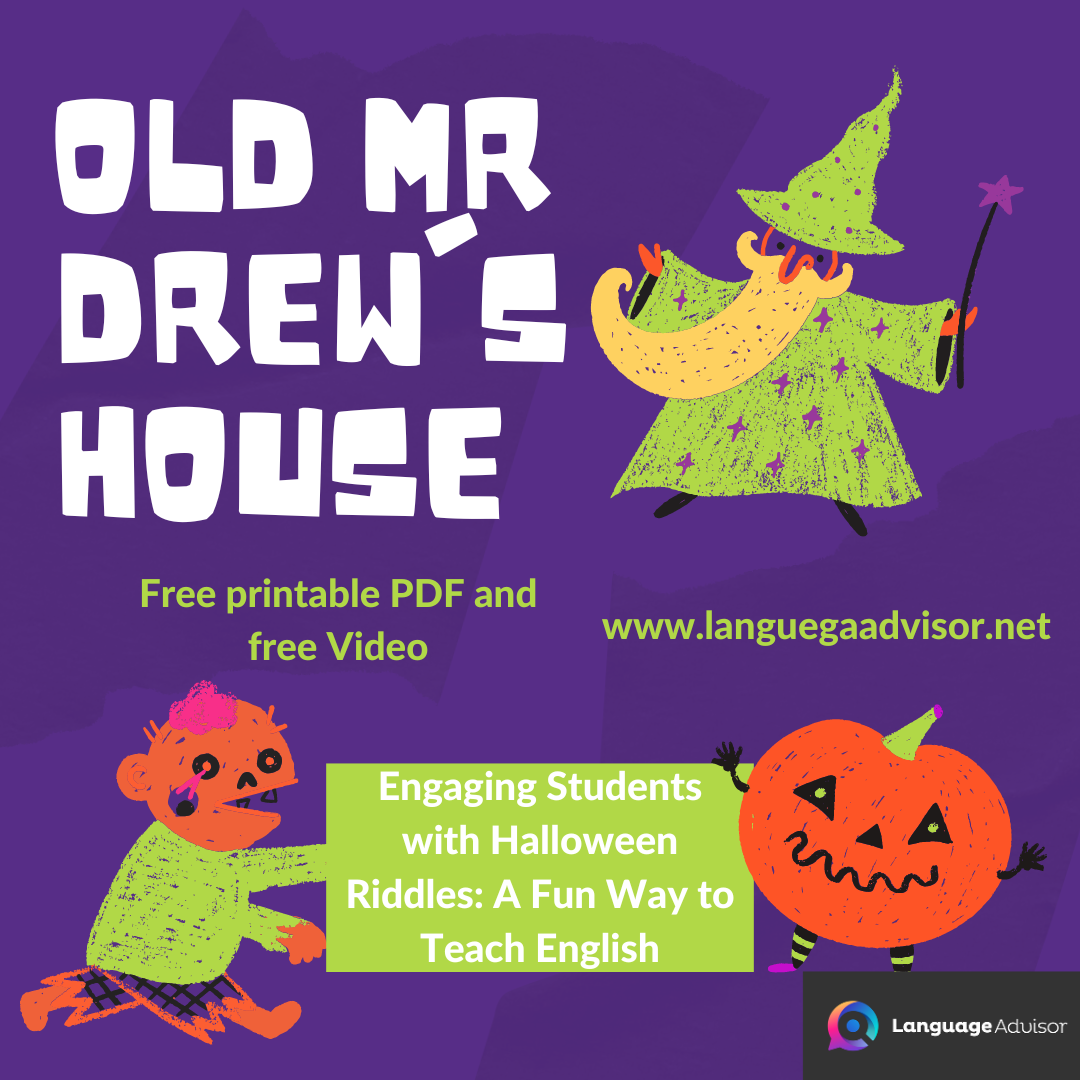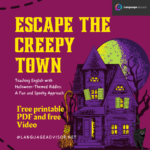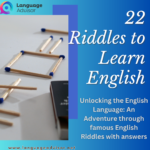Old Mr Drew’s House – Halloween Riddles – Engaging Students with Halloween Riddles: A Fun Way to Teach English. Free printable PDF and free Video
Old Mr Drew’s House – Halloween Riddles

Halloween is the perfect time to bring creativity, problem-solving, and a sense of mystery into your English lessons. Using riddles during this spooky season is a fantastic way to get students thinking critically, using new vocabulary, and practicing their comprehension and reasoning skills. In this blog post, we will explore how Halloween riddles can be used as an interactive and exciting activity to teach English.
Why Use Riddles in Language Learning?
Riddles are a wonderful tool for language learners because they:
- Promote critical thinking: Students must analyze clues and think logically to solve the puzzle.
- Enhance vocabulary: Riddles often contain new or unusual words, giving students the opportunity to expand their vocabulary.
- Boost speaking and listening skills: By discussing riddles with classmates, students practice speaking clearly and listening to others’ ideas.
- Encourage creative thinking: Students must often think outside the box to find the answer.
Now, let’s dive into how to use Halloween-themed riddles effectively in your classroom.
1. The Spooky House Riddle Adventure
This riddle exercise begins with a story that pulls students into a creepy Halloween adventure. Present this narrative to the class to set the mood:
Story Setup:
“Old Mr. Drew’s house was deep in an abandoned garden and looked scary. Nobody wanted to go near it. The neighbors didn’t know if the old man was still alive, and people said the house was haunted. Every Halloween, something strange would happen at the house, and nobody knew why. Today, Tom and his sister Tina decided to uncover the mystery.”
Students can be asked to imagine they are Tom or Tina. As they progress through the story, they’ll encounter various riddles that they need to solve to unlock the next part of the adventure.
2. Riddle 1: The Mysterious Address
This riddle helps develop students’ logical thinking and deduction skills.
Riddle:
Nick didn’t like Halloween, but his sister Mary did. She brought home a new friend, Daphne. When Mary’s mother asked Daphne where she lived, she said, “37 Autumn Street.” Mary went to Daphne’s house, but Nick knew something was wrong. How did Nick know his sister was in danger?
Answer: 37 Autumn Street is a cemetery. This riddle encourages students to pick up on subtle clues and make inferences based on the context. After guessing, students can discuss why this answer makes sense, practicing their reasoning and sentence-building skills.
3. Riddle 2: Find a Way Out
This riddle involves choosing between three dangerous paths, perfect for practicing descriptive language and decision-making.
Riddle:
You’re trapped in a cave with three exits.
- The first exit is filled with pumpkins and a poisonous green mist.
- The second is blocked by a deadly fence with bones scattered around.
- The third has creepy black tentacles.
Which path will you take?
Answer: The first exit, since pumpkins are harmless, and there’s no mention that the mist itself is fatal. This riddle invites students to evaluate risks and prioritize their choices, practicing conditional language like, “If we go through the second exit, we might…”
4. Riddle 3: The Sinister Clown
This riddle tests students’ ability to follow a storyline and think critically about the outcome.
Riddle:
Pete came home early from vacation because he was scared of a creepy clown that kept changing its appearance. He sat on the couch to relax, but suddenly the clown appeared again! Pete ran, but no matter where he went, the clown kept showing up. Finally, the clown trapped Pete in the attic and pinned him against the wall. How did Pete escape?
Answer: Pete was dreaming the whole time. This riddle challenges students to interpret the narrative and recognize that sometimes, the simplest answer (a dream) is the correct one.
5. How to Facilitate the Riddle Activity in Class
- Group Work: Divide the students into small groups. Present each riddle to the class, and let each group discuss possible answers before sharing with the class.
- Vocabulary Exploration: After each riddle, explore any new or challenging vocabulary that students encountered. For instance, discuss words like abandoned, haunted, realize, and litter in context. This not only improves vocabulary but also helps students understand how these words are used in real-life situations.
- Creative Writing: Once students solve the riddles, ask them to write their own spooky riddles using the vocabulary and language structures they’ve learned. They can then share their riddles with classmates, encouraging peer-to-peer learning.
6. Why Halloween Riddles Work in the Classroom
- Encourages Engagement: Riddles are inherently fun and engaging, especially when tied to a holiday like Halloween.
- Promotes Collaboration: Working in groups to solve riddles encourages communication, idea sharing, and teamwork.
- Builds Confidence: Successfully solving riddles gives students a sense of achievement and boosts their confidence in using the language.
- Improves Critical Thinking: Each riddle requires students to analyze clues, make inferences, and think critically to arrive at a solution.
Old Mr Drew’s House – Conclusion
Halloween riddles are an excellent way to bring some spooky fun into your English lessons while developing essential language skills. They offer a unique opportunity for students to practice vocabulary, critical thinking, and creative writing, all while staying engaged in a festive atmosphere. Whether you use riddles as a standalone activity or part of a larger Halloween-themed lesson, your students are sure to enjoy the challenge. Try incorporating these riddles into your next lesson and watch your students solve them with enthusiasm!
Happy Halloween, and let the riddle-solving begin! 🎃

Old Mr Drew’s House

Old Mr. Drew’s house was deep in an abandoned garden and looked scary.
Nobody wanted to go near it. The neighbors didn’t know if the old man was even alive. No one had seen him for many years and people said the house was haunted. Every year on Halloween, the old man’s house was transformed. No one knew why this was happening. The guys living in the neighborhood tried to get into the house, but they failed every time.
Today, Tom told his sister Tina that he would reveal the secret of the old house … she went along with him, to make sure he didn’t cheat.
“Ouсh! Enough, Tommy! Ok, ok, you’re brave and clever but … let’s go home!”
“No one wanted you here, coward!
You came by yourself, so let’s keep going… or are you too chicken?”
He grabbed Tina by the arm, took a step and … fell into the ground, dragging her with him.
“It’s an underground passage! It might lead us into the house!”
The dirt tunnel led into a huge basement. An old skinny man sat in a corner, wrapped in a blanket, warming himself on a small stove.
“Finally… I’ve been waiting for you for so long .. Help me and you can return home!”
“What do we have to do?”
“Riddles… Do you like riddles? Look into the fire!”
The Mysterious address
Nick didn’t like Halloween, but his sister Mary did. She was out the whole day, and came back in the evening with her new friend.
“This is Daphne,” she told her parents, “Can we play together?”
Her mother didn’t mind.
Mary’s mother asked Daphne where she lives and she gave this address: 37 Autumn Street. Mary was allowed to go with her, but Nick soon realized his sister was in danger!
He ran out of the house and chased after them.
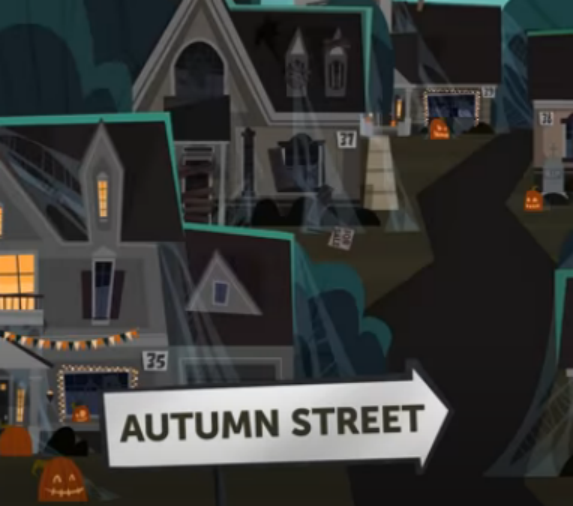
How did Nick know she was in danger?
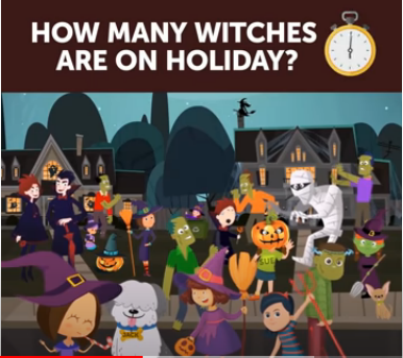
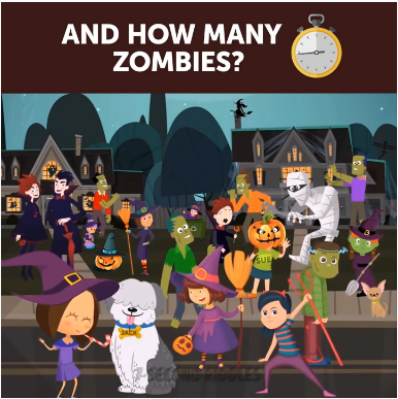

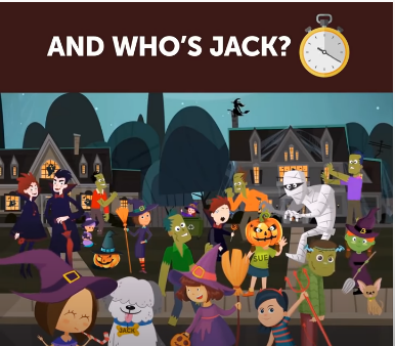
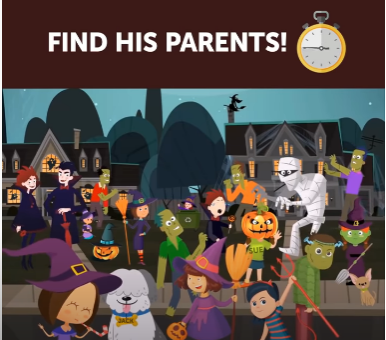
Find a way out
“You are in a cave with three exits. Want to escape?
The first is littered with pumpkins and a poisonous green mist.
The second is blocked by a deadly fence with a lot of bones near it.
The 3rd exit has some creepy black tentacles.
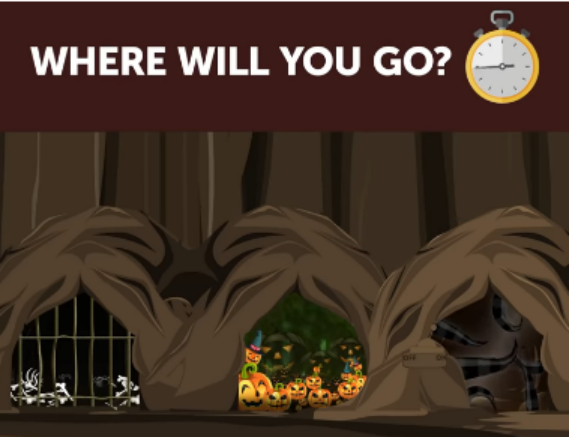
Where will you go ?”
The sinister clown
Pete came home early from vacation. He left before his friends, because he was so afraid of a creepy clown. The clown kept changing his looks and had a high-pitched scream. Pete collapsed on the couch and closed his eyes…
Suddenly the same clown attacked him from behind! Pete screamed, jumped off the couch and ran, but the clown followed him everywhere he went. He ran faster than he had ever run in his entire life, but the clown kept popping up in front of him!
Finally, the clown dragged Pete into the attic, pressed him against the wall …
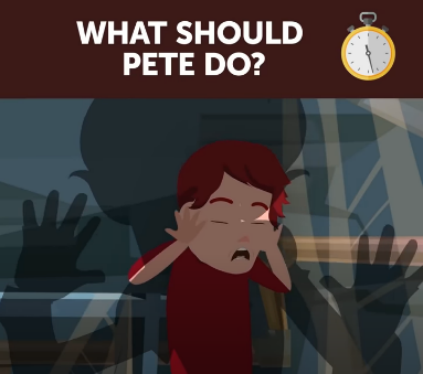

Old Mr Drew’s House – Vocabulary banks
abandon – noun the trait of lacking restraint or control; reckless freedom from inhibition or worry; a feeling of extreme emotional intensity; verb stop maintaining or insisting on; of ideas or claims; leave someone who needs or counts on you; leave in the lurch; give up with the intent of never claiming again; forsake, leave behind; leave behind empty; move out of
haunted – adj. having or showing excessive or compulsive concern with something; inhabited by or as if by apparitions; showing emotional affliction or disquiet
transformed – adj. given a completely different form or appearance
reveal – verb make clear and visible; disclose directly or through prophets; make known to the public information that was previously known only to a few people or that was meant to be kept a secret; make visible
passage – noun the act of passing from one state or place to the next; a journey usually by ship; the act of passing something to another person; a bodily reaction of changing from one place or stage to another; a way through or along which someone or something may pass; a path or channel or duct through or along which something may pass; a section of text; particularly a section of medium length; a short section of a musical composition; the passing of a law by a legislative body; the motion of one object relative to another
basement – noun the lowermost portion of a structure partly or wholly below ground level; often used for storage; the ground floor facade or interior in Renaissance architecture
Mysterious – adj. having an import not apparent to the senses nor obvious to the intelligence; beyond ordinary understanding; of an obscure nature
realize – verb make real or concrete; give reality or substance to; expand or complete (a part in a piece of baroque music) by supplying the harmonies indicated in the figured bass; convert into cash; of goods and property; perceive (an idea or situation) mentally; be fully aware or cognizant of; earn on some commercial or business transaction; earn as salary or wages
litter – noun conveyance consisting of a chair or bed carried on two poles by bearers; the offspring at one birth of a multiparous mammal; rubbish carelessly dropped or left about (especially in public places); material used to provide a bed for animals; verb give birth to a litter of animals; make a place messy by strewing garbage around; strew
poisonous – adj. marked by deep ill will; deliberately harmful; not safe to eat; having the qualities or effects of a poison
mist – noun a thin fog with condensation near the ground; verb become covered with mist; spray finely or cover with mist; make less visible or unclear
deadly – adj. (of a disease) having a rapid course and violent effect; causing or capable of causing death; of an instrument of certain death; involving loss of divine grace or spiritual death; extremely poisonous or injurious; producing venom; exceedingly harmful; adv. as if produced by death; as if dead; (used as intensives) extremely
tentacle – noun any of various elongated tactile or prehensile flexible organs that occur on the head or near the mouth in many animals; used for feeling or grasping or locomotion; something that acts like a tentacle in its ability to grasp and hold
vacation – noun the act of making something legally void; leisure time away from work devoted to rest or pleasure; verb spend or take a vacation
creepy – adj. causing a sensation as of things crawling on your skin; annoying and unpleasant
collapse – noun a mishap caused by something suddenly falling down or caving in; an abrupt failure of function or health; the act of throwing yourself down; a sudden large decline of business or the prices of stocks (especially one that causes additional failures); verb lose significance, effectiveness, or value; break down, literally or metaphorically; cause to burst; fold or close up; collapse due to fatigue, an illness, or a sudden attack; suffer a nervous breakdown; fall apart
couch – noun a narrow bed on which a patient lies during psychiatric or psychoanalytic treatment; a flat coat of paint or varnish used by artists as a primer; an upholstered seat for more than one person; verb formulate in a particular style or language
entire – adj. constituting the full quantity or extent; complete; (used of domestic animals) sexually competent; (of leaves or petals) having a smooth edge; not broken up into teeth or lobes; constituting the undiminished entirety; lacking nothing essential especially not damaged; noun uncastrated adult male horse
attic – adj. of or relating to Attica or its inhabitants or to the dialect spoken in Athens in classical times; noun (architecture) a low wall at the top of the entablature; hides the roof; informal terms for a human head; the dialect of Ancient Greek spoken and written in Attica and Athens; floor consisting of open space at the top of a house just below roof; often used for storage

Old Mr Drew’s House
DOWNLOAD THE PDF FOR FREE


